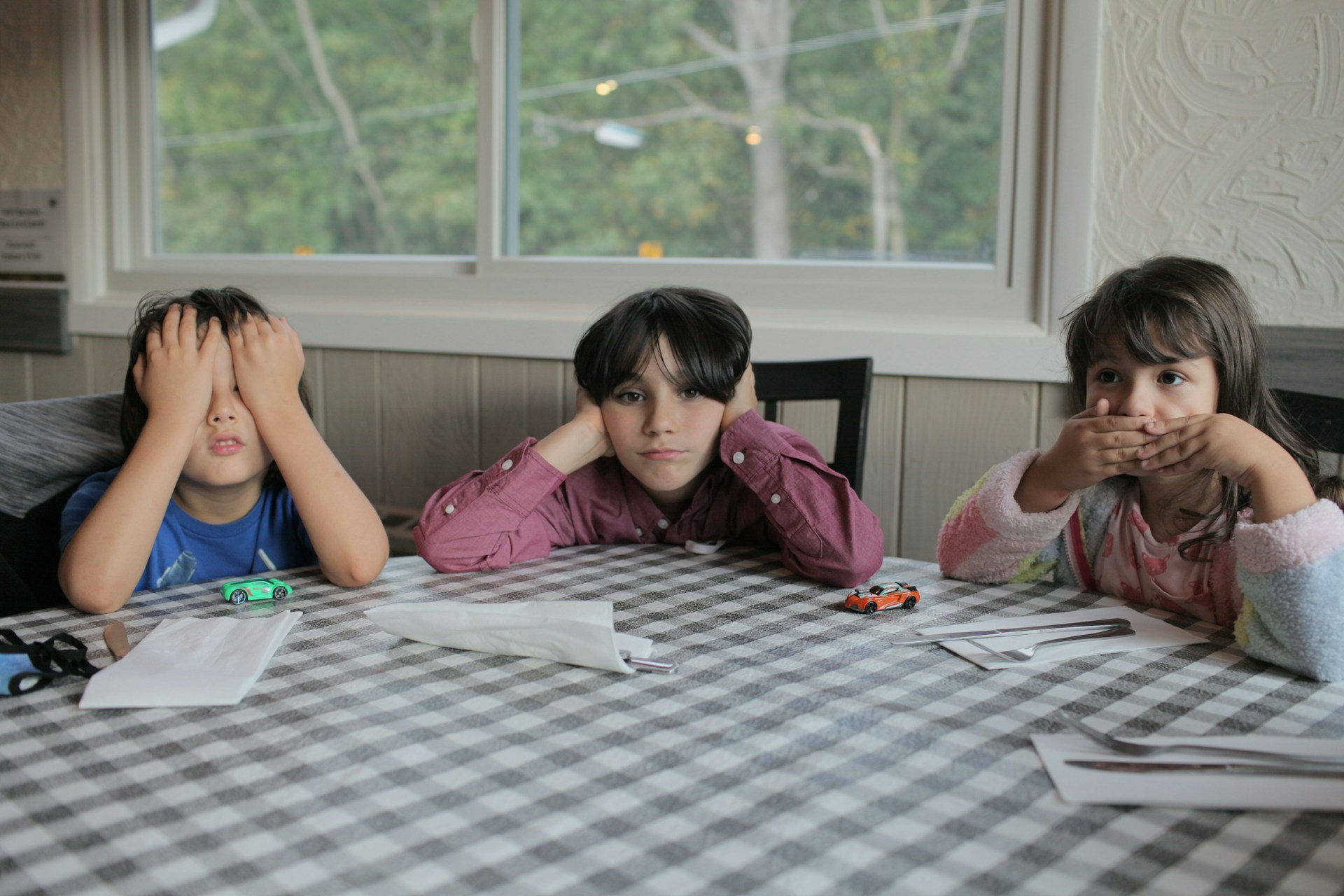Need some parenting tips? If you're worried you're spoiling your child a little bit too much, we're here to give you all the info you need. Here are 10 signs that you spoil your child and 10 discipline techniques to follow if you're looking for ways to avoid that.
1. No Responsibilities
It's necessary to start giving your child chores or responsibilities at a young age so they understand the importance of doing their part and helping out the family. If you don't give them any and just let them do whatever they want all day, it's a clear sign of spoiling.
2. Lack of Patience
Does your kid throw a tantrum when they don't immediately get what they want? Whether it's waiting for their turn in a game, waiting to open a present, or not getting to go to the restaurant they want, if they act with frustration right away, it just means they're too used to receiving what they want and when they want it.
 Photo by Oskar Kadaksoo on Unsplash
Photo by Oskar Kadaksoo on Unsplash
3. Overspending on Gifts
Giving your kid a well-deserved present for their hard efforts is important in creating special moments and bonds, but giving them overly-expensive gifts for no reason at all is a bit much. All it'll do is give them unrealistic expectations about receiving rewards and the value of money.
 Photo by Thought Catalog on Unsplash
Photo by Thought Catalog on Unsplash
4. Limited Boundaries
You are the parent, meaning you need to set boundaries and rules for your kids to follow. It's a necessary part of growing up - learning what should and shouldn't be done. So if these rules aren't reinforced and your child does things casually like talking back or not doing their chores, it means that the boundaries you've set are far too loose and flexible.
 Photo by Sai De Silva on Unsplash
Photo by Sai De Silva on Unsplash
5. Over-packed Schedule
Here's a mistake you might not have considered as "spoiling" your child - cramming their schedule with activities and events. Your child is allowed to have their own voice too, and that means they should get a say in what they want to do. Filling up their calendar like that might just be you trying to overindulge in too many opportunities that you want them to have.
 Photo by S&B Vonlanthen on Unsplash
Photo by S&B Vonlanthen on Unsplash
6. Inability to Handle Failure
Life has its ups and downs and everyone experiences their own fair share of losing as they move forward. That's why it's important to teach your child resilience and coping with loss at a young age. You have to teach them how to take failure as a learning lesson.
 Image by PublicDomainPictures from Pixabay
Image by PublicDomainPictures from Pixabay
7. Constant Center of Attention
If everything always revolves around your child and their wishes, it's an easy way to make them feel spoiled and get them accustomed to getting attention. It's especially dangerous if they're an only child.
 Image by Neil Dodhia from Pixabay
Image by Neil Dodhia from Pixabay
8. Demanding Behavior
You might feel the need to give into everything your child asks for, whether it's a new toy they've been wanting or your undivided attention, but you need to know when it's okay to give it and when it's not. If they're throwing tantrums and crying because their demands are not being given into, it's a sign that they're spoiled.
9. No Appreciation for Value
Whether it's breaking toys or throwing things around without much care, it could be a sign that your child doesn't understand the value behind objects and that things given to them should be appreciated and taken care of. It's an important lesson to teach them, or they might grow to become careless in the future.
 Photo by Thomas Park on Unsplash
Photo by Thomas Park on Unsplash
10. Social Challenges
Some children who get overly spoiled might feel challenged socially because of their inability to compromise or share. When kids play together, it's all about taking turns and making sure everyone is enjoying their time. So if your child is unable to participate in that, it can only lead to conflict.
 Photo by 🇸🇮 Janko Ferlič on Unsplash
Photo by 🇸🇮 Janko Ferlič on Unsplash
1. Consistent Rules
A good way to establish order in the house is by setting clear and consistent rules for your children to follow. It lets them know exactly what is expected of them and how they should be acting. It's also important that you let them know the consequences if they ever decide to misbehave and go against them.
 Photo by Some Tale on Unsplash
Photo by Some Tale on Unsplash
2. Natural Consequences
It may feel harsh, but giving your child punishment for their actions is a necessary step in teaching them what's right and wrong. Of course, you never need to be overly strict and you should always explain to them why this is happening, but consequences happen so that we can learn from them.
 Photo by Keren Fedida on Unsplash
Photo by Keren Fedida on Unsplash
3. Time-Outs
In more drastic situations, time-outs can be an effective lesson for when your child is misbehaving. It gives them time to reflect on their actions, while also providing a quiet and safe space for them to process their emotions. Make sure you explain to them why they're receiving this punishment though!
 Photo by Annie Spratt on Unsplash
Photo by Annie Spratt on Unsplash
4. Positive Reinforcement
Disciplining your child doesn't have to mean being strict. It's not all about punishing bad behaviour! Positive reinforcement is a great way to teach your child good behaviour by rewarding them when they follow the rules, achieve a goal, or do something kind for others. Good behaviour deserves to be treated!
 Photo by Thiago Cerqueira on Unsplash
Photo by Thiago Cerqueira on Unsplash
5. Structured Choices
Giving your child the freedom to pick from choices you set within your boundaries is a smart way to give them a sense of control. It doesn't have to be big decisions, it can be as small as having them pick between two snacks that they want or two toys they both like. It shows them that sometimes, you can't have everything.
 Photo by David Straight on Unsplash
Photo by David Straight on Unsplash
6. Task-Oriented Discipline
As we've already mentioned, having your child do chores at a young age is how you teach them responsibility and the importance of helping others. Helping with laundry, sweeping the floor, or washing dishes are especially great tasks to give them if they're bored or don't have anything to do. You don't have to phrase it as a "chore" even - tell them that what they're doing is helping the family!
 Photo by Muhammad-taha Ibrahim on Unsplash
Photo by Muhammad-taha Ibrahim on Unsplash
7. Withdrawal of Privileges
Bad behaviour needs to be punished in a way where the child can understand their wrongdoings. One way you can do this is by taking away certain privileges associated with their misbehaviour. One example of this is if they disobey your orders and misuse the tablet during their screen time, you can take it away until they understand what they did wrong.
 Photo by Arwan Sutanto on Unsplash
Photo by Arwan Sutanto on Unsplash
8. Clear Communication
When following all of these discipline techniques, the most important thing to remember if that you're always explaining your actions and reasoning behind your punishments. They should never be done without cause! Just punishing kids for their bad behaviour isn't enough - they have to understand why it's unacceptable too so that they can make better choices moving forward.
 Photo by Colin Maynard on Unsplash
Photo by Colin Maynard on Unsplash
9. Modeling Behavior
It's been proven by psychologists that one way children learn is from imitation; they follow the behaviour of their parents. With this in mind, it's important that you be the role model that they deserve and demonstrate the behaviour you want to see in them. Show them how to be patient, respectful, kind, and empathetic so that they can internalize those traits too.
 Photo by Sergiu Vălenaș on Unsplash
Photo by Sergiu Vălenaș on Unsplash
10. Routine and Structure
Having a daily routine that's consistent and well-established can help your child learn how to manage their time and responsibilities. Providing clear and specific times for when they can be free to play or when they should be doing chores or homework can give them a better picture of what to expect in a day.










